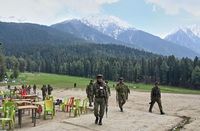On May 6, 2025, India launched a series of missile strikes against nine locations in the Kashmir region, which is controlled by Pakistan. The attacks resulted in at least eight deaths and 12 injuries, including a child, according to initial reports from the Pakistani government. The Indian Armed Forces claimed responsibility for the operation, dubbed "Operation Sindoor," stating it was aimed at targeting terrorist infrastructures in Pakistan that had been involved in planning attacks against India.
The strikes occurred amidst heightened tensions between the two nuclear-armed neighbors, particularly following a deadly attack on April 22, 2025, in Pahalgam, India, where 26 people, mostly Hindu tourists, were killed. Indian officials have accused Pakistan of supporting the militants behind that attack, a claim that Islamabad has categorically denied.
Witnesses in Muzaffarabad, the capital of Pakistani-administered Kashmir, reported hearing explosions and experiencing power outages as a result of the missile strikes. The Indian government, in its statements, emphasized that the attacks were "focused, measured, and non-escalatory," insisting that no Pakistani military installations were targeted. Instead, the strikes were described as targeting camps used by terrorist organizations.
In a statement, the Indian Ministry of Defense underscored that the operation was a response to the terrorist threat posed by groups operating from within Pakistan. "Our actions were concentrated, measured, and non-escalated in nature. No Pakistani military installations were targeted. India has demonstrated considerable restraint in target selection and execution method," the statement read.
However, the Pakistani military quickly condemned the strikes, with spokesperson Lt. Gen. Ahmed Sharif Chaudhry asserting that Pakistan would respond at a time and place of its choosing. He labeled the Indian attacks as "cowardly" and stated that they would not go unanswered. "This heinous provocation will not go without response," he told reporters.
In the wake of the missile strikes, Pakistani Prime Minister Shehbaz Sharif characterized the attack as an "act of war," asserting that Pakistan has every right to retaliate. He stated, "A forceful response is being given," emphasizing the seriousness of the situation and the need for a robust national security strategy.
As tensions escalated, India announced plans to cut off water from rivers flowing into Pakistan, suspending its participation in a 1960 water-sharing treaty. Prime Minister Narendra Modi declared in a public address that the water, which had previously flowed into Pakistan, would be retained for domestic use within India. This decision has raised concerns in Pakistan, with officials warning that any alteration of river flows would be considered an act of war.
Pakistani officials have reported a notable reduction in the flow of the Chenab River, further escalating the situation. Kazim Pirzada, the irrigation minister for Punjab, expressed concern over the changes in water flow, stating, "We have noticed changes in the Chenab that are anything but natural. The normal flow of the river has been significantly reduced overnight."
The Kashmir region has been a longstanding point of contention between India and Pakistan since the partition of British India in 1947. Both countries claim the region in its entirety, leading to multiple wars and ongoing conflicts. The Line of Control (LoC) currently divides the region, but the insurgency and military operations continue to fuel tensions.
Since the April 22 attack, both nations have engaged in exchanges of fire along the border, with reports of insurgent groups participating in the conflict. Following the missile strikes, the Pakistani military reported that it had destroyed an Indian military headquarters and targeted military posts, as well as downing Indian aircraft.
The situation remains fluid as both nations navigate this precarious moment in their history. The international community is watching closely, as any miscalculation could have severe consequences not just for India and Pakistan, but for regional stability as a whole.
With both countries on high alert, the potential for further escalation looms large. The Pakistani government has called for an emergency meeting of its National Security Committee to reassess its response strategy to what it describes as India's "war madness." Meanwhile, the Indian government continues to assert its right to defend itself against perceived threats from across the border.
As the world watches, the hope for a peaceful resolution appears increasingly distant, with both nations entrenched in their positions and unwilling to back down.





